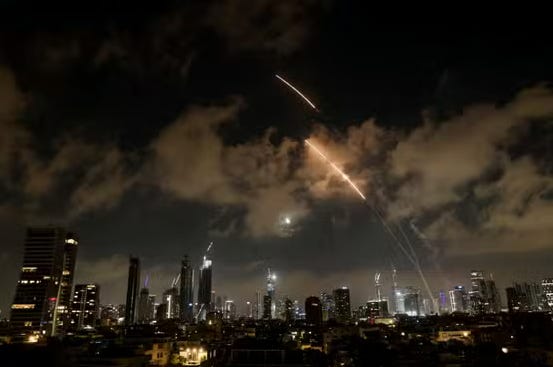Trump Turns Up Heat On Iran, Fueling War Fears
World leaders call for de-escalation as missile and air attacks intensify.
President Donald Trump appears to be leaning sharply toward ordering US military action against Iran and cooling on diplomacy as Israel's conflict with Tehran intensifies for a sixth day in a volatile mix of airstrikes and nuclear fears that threatens a broader war.
‘I’m not too much in the mood to negotiate with Iran,’ Trump told reporters traveling with him aboard Air Force One as he returned from the Group of 7 summit in Canada on 17 June. Trump insisted the goal was not a ceasefire, but a ‘real end’
Trump later called for Iran’s “UNCONDITIONAL SURRENDER!” in a social media post and made a not-so-veiled threat against Iran’s Supreme Leader Ali Khamenei: ‘We know exactly where the so-called ‘Supreme Leader’ is hiding… We are not going to take him out (kill!), at least not for now.’
Trump met with members of his national security team in the White House Situation Room on Tuesday and was presented with options for joint US-Israel strikes on Iranian nuclear sites, a source told CNN.
The US has deployed dozens of combat aircraft along with aerial refueling tankers to the region in anticipation of long-range bombing missions or defensive operations. Iran has prepared missile systems for strikes against US assets in the region, according to The New York Times, and could respond by mining the Strait of Hormuz. Iran announced early Wednesday, 18 June, that it had fired hypersonic missiles at Israel.
The US-based Institute for the Study of War said Israel had struck Iran in roughly 200 airstrikes since the start of the campaign on 12 June, while Iran had landed 39 missiles on Israel.
Foreign policy experts warn that US involvement could radically alter the conflict. ‘It would remove any ability for Iran to back down,’ said Dr. Dara Conduit, a political science lecturer at the University of Melbourne, told the BBC. ‘It’s a scary proposition.’
Although Israel has struck Iranian nuclear sites like Natanz, assessments suggest the damage may only delay Iran’s program by months. Crucially, Fordo, a key underground enrichment site, remains intact. Intelligence agencies continue to maintain that Iran had not resumed a nuclear weapons program, contradicting Trump’s claim that Tehran was ‘very close’ to building a bomb.
Complicating the diplomatic stakes is China's deep economic reliance on Iranian oil. More than 90 percent of Iran’s oil exports now flow to China, mostly through clandestine shipments to evade US sanctions. Beijing has publicly condemned Israel’s actions and warned escalation endangers regional stability.
President Xi Jinping, speaking on the sidelines of a summit with five Central Asian nations in the Kazakh capital of Astana, said China was ‘deeply worried’ and opposes Israeli violations of Iran’s sovereignty.
‘All parties should work to de-escalate the conflict as soon as possible and prevent the situation from worsening further," Xi said, according to Chinese state broadcaster CCTV.
G7 Leaders Speak
German Chancellor Friedrich Merz said in an interview with German broadcaster ZDF that Israel was doing the West’s ‘dirty work’ by taking down Iran’s alleged nuclear weapons program.
‘This is the dirty work that Israel is doing for all of us,’ Merz said, sharply criticizing Iran for fomenting ‘death and destruction’ through its proxies Hamas and Hezbollah. Merz said the October 7 Hamas attack would ‘never be possible without the regime in Tehran.’
French President Emmanuel Macron appeared to oppose tougher military action against Tehran that could lead to regime change and plunge Iran and the region into ‘chaos’.
Instead, he called on Trump to initiate a new diplomatic round. ‘I believe we need the United States of America to bring everyone back around the table,’ Macron told reporters at the G7 summit.
UK Prime Minister Keir Starmer, in an interview with Sky News, downplayed the prospect of a US strike on Iran. Starmer said ‘nothing’ he had heard sitting next to Trump in two hours of discussions among the G7 leaders suggested the US president was inclined to join in Israel attacks.
Oil Prices Stabilize
Brent crude traded near $77 a barrel, while West Texas Intermediate was above $75 after stabilizing at the highest level in almost five months, according to Bloomberg.
‘Trump’s demand for Iran’s ‘unconditional surrender’ and threats against its supreme leader signal diplomacy is off the table,’ Charu Chanana, chief investment strategist at Saxo Markets Ltd. in Singapore, told Bloomberg. A ‘worst-case scenario blockade of Hormuz, could send prices sharply higher,’ she added.
Following the G7 Summit in Canada, world leaders gave varying assessments of Trump’s posture after two hours of discussion behind closed doors about how to de-escalate the war.




